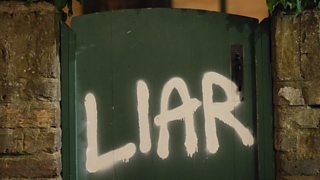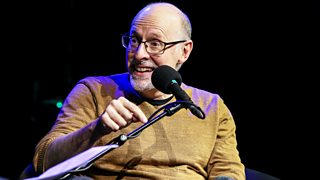A psychologist’s tips on how to spot a liar
How do you tell if someone is lying? When Professor of Psychology Richard Wiseman conducted a nationwide experiment to identify the tell-tale signs, the results were surprising.
In The Life Scientific he shares his top tips for how to spot a fibber.

How do you spot a liar?
Richard’s first mass participation experiment was The MegaLab Truth Test. Question Time presenter Robin Day was filmed talking about his favourite movie, twice.

In one video he told the truth, but the other contained a pack of lies. Both videos were then played live on Tomorrow’s World and viewers were asked to phone in and guess in which one Robin was telling the truth. This enabled Richard and his team to identify the cues that we all use to detect when someone is lying. As well as the Tomorrow World footage they also broadcast the soundtrack on Βι¶ΉΤΌΕΔ Radio and placed the transcript in the Daily Telegraph.
1. Don’t look at a liar, just listen
It transpired that people were better lie detectors when they just heard the soundtrack or read the transcript. Those who watched it on television struggled to detect the lies. This is because visual cues distract us from what is being said and good liars can control their body language more easily than their voice. So, if you want to spot a liar, don’t look at them. Listen to what they say and how they say it. If you want to distinguish fact from fiction then radio, not TV or video, is your friend…
-
![]()
The Life Scientific
Magician and Professor of Psychology, Richard Wiseman tells Jim Al-Khalili how to spot a liar.
2. Beware a shortage of personal references
People tend to drop out personal references when they’re lying, so “me”, “my” and “I” drop away.
3. Liars say less
Perhaps to minimise the risk of dropping themselves in it, liars tend to say less. Robin Day said about half the amount when he was lying than when he was telling the truth.
4. Look for pauses after questions
There’s a bigger response latency – the period of time between the end of the question and the beginning of the answer – when people are lying.
5. Liars are less emotional
With lies, there’s a drop in emotionality.
Are you a natural born liar?

Professor Richard Wiseman reveals some fascinating facts and an experiment you can do.
6. Pay extra attention to your nearest and dearest
Depressingly, Richard has also shown that our nearest and dearest are the most able to deceive us. When you get people who have been friends or partners for twenty years they’re very confident about detecting lies but, in reality, particularly bad at it. The better you get to know someone, the easier it is for them to lie to you undetected.

